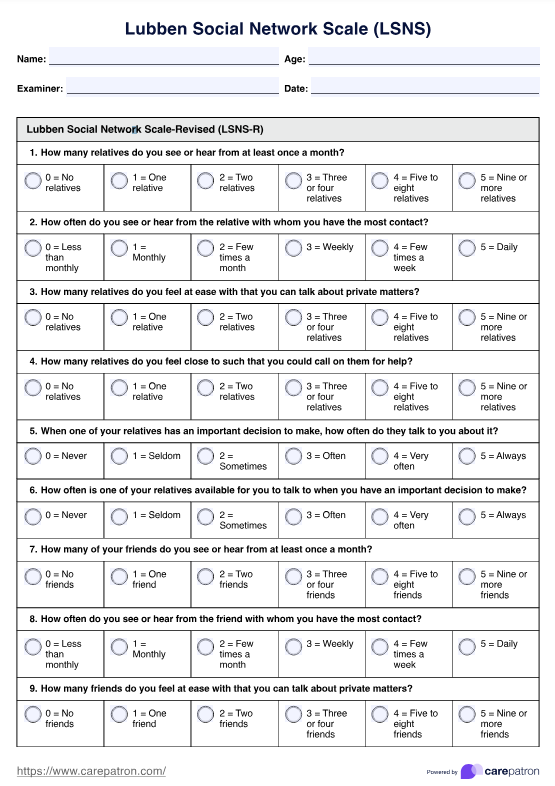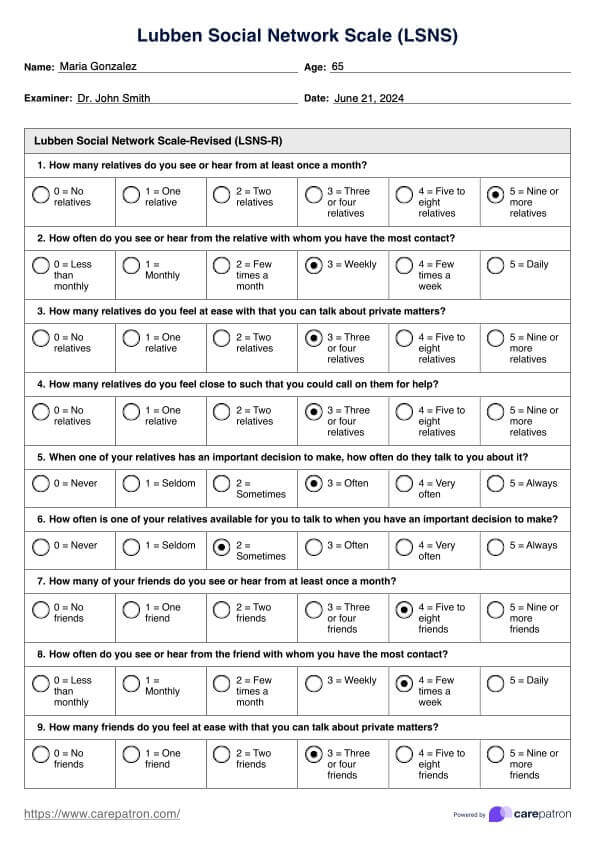Lubben Social Network Scale (LSNS)
Explore the benefits of the Lubben Social Network Scale for detecting social isolation and enhancing late-life health. Download our free template now!


What is the Lubben Social Network Scale?
The Lubben Social Network Scale (LSNS) is a tool designed to measure the social networks of older adults, assessing the size, closeness, and frequency of contact within their social network. This scale is crucial in identifying older adults at risk of social isolation, which is increasingly recognized as a significant health and well-being issue.
Developed to gauge social isolation and facilitate late-life health, the LSNS provides insights correlating with social and health indicators, making it a valuable resource in social and behavioural sciences research, as well as clinical settings. It highlights the importance of social connections in maintaining health, particularly among the elderly.
The LSNS operates on a series of questions covering familial and friendship ties, quantifying respondent's social network and perceived support level. This helps identify individuals who might benefit from interventions to reduce isolation and improve social integration.
Versions of the LSNS
The Lubben Social Network Scale has several versions tailored to different research and clinical needs. These include the LSNS-R, LSNS-6, and LSNS-18.
- LSNS-R: The revised version focuses on detailed aspects of social interaction and support within both family and friendship networks, but doesn't differentiate neighbors from friends.
- LSNS-6: A shorter version with only six questions designed for quicker assessments while maintaining reliability.
- LSNS-18: The most comprehensive version, including eighteen questions that cover family, friends, and neighbors to provide a thorough analysis of social networks.
How is each LSNS version scored?
All the Lubben Social Network Scale versions scores involve an equally weighted sum of responses to several items that ask about the number of people the respondent feels close to, the number they can call on for help, and the number they interact with at least once a month. The responses are typically on a scale from 0 (none) to 5 (nine or more contacts), with higher scores indicating larger, more robust social networks. Here are the cutoffs for each one (Lubben et al., 2006):
- LSNS-R: A score below 30 suggests social isolation.
- LSNS-6: A score below 12 suggests social isolation.
- LSNS-18: A score below 45 suggests social isolation.
Next steps after using this scale
After summing up a respondent's LSNS score, healthcare providers can start to tailor interventions. Recommendations might include encouraging participation in community engagement activities, connecting individuals to support groups, or directing them to mental health services, all aimed at enhancing perceived social support and improving quality of life.
Lubben Social Network Scale Template
Lubben Social Network Scale Example
How to use our Lubben Social Network Scale template
Our free printable LSNS template contains all three versions of the LSNS, making it useful for both researchers and social workers. Here's how to integrate it into your social work or practice:
Step 1: Access this template
Download the Lubben Social Network Scale template from our website or access it through the Carepatron app. Ensure you have the necessary permissions to use the template with your patients.
Step 2: Explain the template
Before beginning the assessment, explain to your patient the purpose of the LSNS and how it will help in understanding their social support network. Ensure they understand each question and how to respond accurately.
Step 3: Execute the test
Guide the patient through each question in the template, recording their responses. Ensure the patient answers honestly and clearly to get the most accurate assessment of their social network.
Step 4: Calculate the scores
Sum the responses according to the specific LSNS version used (LSNS-R, LSNS-6, or LSNS-18). Compare the total score against the cutoff values to determine the level of social isolation.
Step 5: Discuss results and plan interventions
Review the results with your patient, discussing areas of strong and weak social support. Develop a plan to address any identified social isolation issues, including community resources, support groups, and potential therapeutic interventions.
Benefits of using the Lubben Social Network Scale
The Lubben Social Network Scale (LSNS) is an invaluable tool with numerous benefits in both clinical and research settings:
Early detection of social isolation
The LSNS is designed to identify individuals at high risk of social isolation early on. This is particularly crucial for older adults, as social isolation can lead to significant declines in both physical and mental health.
Enhanced intervention strategies
By quantifying the strength of an individual's social ties, the LSNS enables healthcare providers to develop targeted interventions. These interventions aim to enhance social connections, potentially improving overall life satisfaction and mental well-being.
Comprehensive assessment of social health
The LSNS provides a detailed view of an individual's social network size, frequency of contact, and perceived intimacy and support, which are important social health indicators. This comprehensive assessment can help guide healthcare decisions and patient care plans.
Facilitating research and community health monitoring
The LSNS is widely used in studies investigating the impact of social factors on health outcomes in aging populations. It helps researchers gauge social isolation's role in health deterioration, contributing to broader public health strategies.
Supporting mental health
The LSNS helps pinpoint areas of weak social support where mental health support might be needed, as a strong social network is often protective against mental health issues.
Policy making and resource allocation
The insights gained from LSNS can assist policymakers in creating more effective community resources and health interventions to increase social engagement among at-risk populations.
These benefits underscore the scale's role in individual health assessment and enhancing the quality of life and mental health through improved social interaction frameworks.
References
Lubben, J., Blozik, E., Gillmann, G., Iliffe, S., von Renteln Kruse, W., Beck, J. C., & Stuck, A. E. (2006). Performance of an abbreviated version of the Lubben Social Network Scale among three European community-dwelling older adult populations. The Gerontologist, 46(4), 503–513. https://doi.org/10.1093/geront/46.4.503
Commonly asked questions
The Lubben Social Network Scale (LSNS) is crucial in clinical settings as it helps clinicians detect patient social isolation. Recognized for its internal consistency and reliability, the LSNS links social isolation to various health risks, highlighting its importance in facilitating late-life health. By identifying isolation early, clinicians can intervene to mitigate associated physical health problems and risks effectively.
Originally developed for older adults, the LSNS's robust framework allows for adaptation to assess social networks across different demographic groups. This versatility provides valuable insights into the social support systems of a broader audience, extending its utility in social and behavioral sciences.
It is advisable to administer the LSNS periodically, especially following significant life events that could impact an individual’s social connections. Regular assessment helps maintain a current view of an individual's social health, which is crucial for facilitating interventions that support late-life health and well-being.

.jpg)



















-template.jpg)


















































































